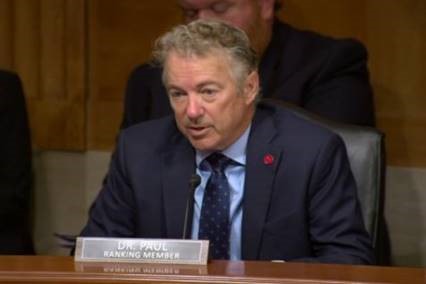WASHINGTON, D.C. – Yesterday, U.S. Senator Rand Paul (R-KY), Ranking Member of the Senate Homeland Security and Governmental Affairs Committee, delivered opening remarks during the committee’s first full hearing of the new Congress, to consider the nomination of Colleen J. Shogan to be Archivist of the United States, National Archives and Records Administration.
Dr. Paul highlighted instances of clear bias involving the National Archives, with the hope that the next leader of the agency will restore the trust that has been broken. He discussed how earlier this year March for Life participants’ First Amendment rights were violated just steps away from the Bill of Rights at the National Archives Museum when they were met with hostility by the Archives staff and forced to cover up or remove any pro-life messages they were wearing. Dr. Paul stressed that the right to free speech is protected regardless of political affiliation or opinion and requested a more extensive investigation into the matter.
He also expressed concern over the apparent partisanship in the agency’s approach to retrieving classified documents and other Presidential records, and raised concerns about the Archives’ seemingly incomplete conclusion to the investigation over the National Institutes of Health (NIH) allegedly prematurely destroying key documents related to the origins of COVID-19.

View the Ranking Member’s opening statement here or by clicking on the photo above.
Remarks as prepared can be found below
Every year, tens of thousands of Americans travel to their nation’s capital to peacefully stand up for the right to life by participating in the March for Life.
It is quintessential First Amendment activity.
Just over a month ago, January 20th, was the 50th annual March.
On their way to the March that morning, dozens of Marchers stopped at the National Archives Museum to see our nation’s founding documents, including the Bill of Rights that guarantees their freedom to participate in the March they were headed to.
Rather than being welcomed as more than a million other visitors are each year, these Marchers, many of whom were school-age, were met with hostility by the Archives staff and forced to cover up or remove any pro-life messages they were wearing.
In just one example of many from that day, one young woman standing mere feet from the original Bill of Rights was told to cover her shirt that read “Life is a HUMAN RIGHT”.
You heard that right, the guards charged with protecting the very parchment our Bill of Rights is written on repeatedly violated the First Amendment rights of Marchers in the presence of the actual First Amendment.
It is hard to imagine a more offensive way to violate their freedom of speech. While I understand some action has been taken, a more serious investigation is necessary.
This is especially true because similar violations occurred at the Air and Space Museum that day as well.
Nothing like this can ever happen again, and we must understand who ordered it or tolerated a culture that enabled it.
And lest anyone think I am being partisan about this, while I know of no similar violations of the speech rights of those on the political left, if there were, I would equally take offense and demand accountability.
Beyond the Museum, the Archives is responsible for preserving Executive Branch documents, and that mission has not been without controversy either. Federal records law should be a strictly nonpartisan affair.
Unfortunately, the difference in how the Archives appears to have handled the disputes over documents held by former President Trump and Vice President Pence on one hand and President Biden on the other raises serious questions about the impartiality of the agency.
Specifically, the agency seems to have aggressively publicized the search for documents at President Trump and Vice President Pence’s residences, but tried to keep quiet about the documents President Biden kept in at least three locations.
While I think the larger issue here is too many things are classified when they don’t need to be, we can’t have a situation where a non-political agency appears to have a partisan bias.
In another document management matter, the Archives investigated allegations that NIH improperly destroyed key documents related to the origins of COVID-19.
The conclusion of that investigation seems to be that the Archives simply accepted NIH’s word that no evidence exists of records being prematurely destroyed.
I have sent more than a dozen letters to NIH and its parent agency, HHS, requesting information relevant to the origins of COVID-19.
I have yet to receive the documents requested in those letters.
Determining whether any documents providing insight into the origins COVID were improperly destroyed warrants more than just a cursory review.
So today I want to hear what the Archives is going to do to ensure that records related to the origins of COVID-19 are properly preserved, as well as a commitment that they will provide us with all documents related to our investigation into the origins of COVID.
Finally, there is a partisan pressure campaign underway to bully the Archivist into unilaterally amending the Constitution.
Congress imposed a deadline of 1982 for thirty-eight states to ratify the E.R.A., a deadline that was not met.
Lately, three states have attempted to ratify the amendment notwithstanding the legal deadline.
Nevertheless, activists, who conveniently ignore the five states which have withdrawn their ratification, want the Archivist to certify adoption of the amendment.
To this point the nominee has rightly resisted such calls, but we will be looking for reaffirmation today.
The National Archives must be a resolutely nonpartisan agency, and of late it has not been. I hope we will walk out of this hearing today with a belief the next leader of the agency will be willing and able to restore the trust that has been broken.
###